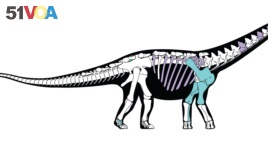10 February, 2018
Researchers have discovered the remains of an up until now unknown dinosaur in Egypt's Western Desert.
The researchers say the long-necked, plant-eating dinosaur was about the size of a city bus.
A group of scientists from Mansoura University in Egypt's Nile Delta area found the remains of the creature. They believe it lived about 100 million years ago.
The group says the find is important because it is one of the few dinosaurs from that period in Earth's history ever found in Africa.
The recently-discovered dinosaur is being called "Mansourasaurus Shahinae." It was named after the university and a founder of its paleontology department.
Hesham Sallam, the team's leader, worked with four Egyptian and five American researchers. They wrote a report on the discovery. It was published January 29 in the journal Nature Ecology & Evolution.
Sallam said, now that his team has found a plant-eating dinosaur, it makes sense that they should try to find a meat-eating dinosaur.
"As in any ecosystem, if we went to the jungle, we'll find a lion and a giraffe. So we found the giraffe, where's the lion?" he asked.
Find does not appear to support earlier theories
Experts say the discovery could help scientists better understand a period in Africa that they know little about. That period is called the Mesozoic Era.
Earlier theories suggested that African dinosaurs developed independently from ones in Europe.
But the researchers say the fossilized skeleton of Mansourasaurus appears to be very similar to European dinosaurs of the same time period. They say this suggests there may have been a land bridge between Africa and Europe at the time.

A skeletal reconstruction of the titanosaurian dinosaur Mansourasaurus shahinae from the Late Cretaceous of the Dakhla Oasis, Egypt, is pictured in this undated handout image obtained by Reuters Jan. 29, 2018.
Other researchers have found the remains of large dinosaurs in Egypt. In 2001, an American team from the University of Pennsylvania published a report on their discovery of a similar dinosaur. However, that dinosaur, called Paralititan Stromeri, was much bigger than Mansourasaurus and the two creatures may not have lived at the same time.
Mansourasaurus is believed to have been the size of an African elephant and, including its tail, was about 10 meters.
The find was the result of hard work and long searches. The group looked around the Western Desert for five years before finding the partial skeleton in 2013.
Sallam said he and a group of graduate students were traveling to a local university when they saw a good place to hunt for bones. They later returned to the place and searched an area covering several kilometers.
Then, one of the students made a discovery. Sallam said he knew immediately that it would be something important from her telephone call.
"She even called me on the phone because I was about two kilometers away from her. And she told me, ‘Doctor, there are a lot of bones, come and see them.' So, I went, and I saw that it was a partial skeleton of a dinosaur. That, for us was a very big thing."
Sallam told his students, "If this comes out as I expect, your names will go down in history."
Now there are hopes that the discovery will bring more financial support for paleontology research in Egypt.
Sallam added that he is pleased that the find can help make science real to people who may not think about it often.
"I mean, we've made the average Egyptian man, or the Arab man, talk about dinosaurs," he said.
I'm Mario Ritter.
Faith Lapidus reported this story for VOA News. Mario Ritter adapted it for VOA Learning English with materials from AP. George Grow was the editor.
________________________________________________________________
Words in This Story
founders –n. a person who creates or establishes something
paleontology –n. the study of ancient bones
fossilized –adj. organic materials that have been buried and changed so that minerals have replaced all of what was once tissue
We want to hear from you. Write to us in the Comments section, and visit 51VOA.COM.